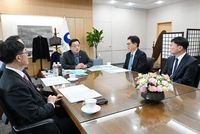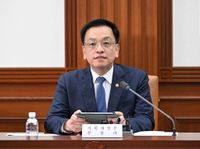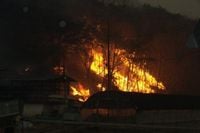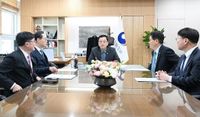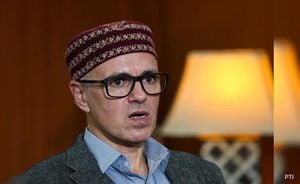On March 26, 2025, Choi Sang-mok, the Deputy Prime Minister for Economic Affairs and Minister of Economy and Finance, convened a crucial meeting at the Government Sejong Office with the heads of four external agencies to address the urgent needs of small business owners affected by wildfires in the Gyeongbuk region. This meeting comes in the wake of devastating wildfires that have already claimed at least 22 lives and damaged over 17,534 hectares of land.
Choi emphasized the importance of seamless tax support for those impacted by the fires, stating, "We must ensure that tax support for small business owners in fire-affected areas is implemented without setbacks." His call for action follows reports from the Central Disaster and Safety Countermeasures Headquarters, which confirmed that the wildfires have resulted in significant loss of life and property.
The meeting included key figures such as Kang Min-soo, Commissioner of the National Tax Service, Ko Kwang-hyo, Commissioner of the Korea Customs Service, Lim Ki-geun, Commissioner of the Public Procurement Service, and Ahn Hyung-joon, Deputy Commissioner of Statistics Korea. Together, they discussed strategies to mitigate the economic impact of the wildfires and other challenges posed by global economic uncertainties.
Choi pointed out that the livelihoods of citizens are increasingly burdened by the uncertain global trade environment and ongoing political and economic instability. He outlined three core tasks that require immediate attention: responding to the intensifying global trade war, maintaining fiscal soundness to protect the nation's credit rating, and revitalizing the economy by stimulating domestic demand and protecting vulnerable groups.
One of the pivotal points discussed was the tax relief measures for businesses in areas declared as special disaster zones due to the wildfires. Choi announced that the National Tax Service will extend tax payment deadlines by up to two years for affected taxpayers. Specifically, the corporate tax payment deadline for approximately 7,000 small and medium-sized enterprises in the impacted regions will be automatically extended from March 31 to June 30, without requiring separate applications.
Additionally, Choi urged the National Tax Service to operate the tax system meticulously to avoid placing further burdens on the economic activities of citizens. He also called for strict enforcement against real estate-related tax evasion practices, such as illegal gifts and false contracts, which have become prevalent in overheated markets. Furthermore, he highlighted the need to address tax evasion through disguised cash transactions in sectors like marriage, childbirth, and education, which disproportionately affect younger generations.
In terms of international trade, Choi stressed the necessity for the Korea Customs Service to enhance its support for domestic exporters, particularly in light of the new U.S. administration's tariff policies. He directed the agency to actively assist exporters with tariff classification and country of origin certification, and to facilitate the rapid customs clearance of imports, especially for tariff quota items.
The Public Procurement Service also received directives to strengthen its role in fostering an ecosystem conducive to the growth of small, venture, and innovative businesses. With the public procurement market expanding to over 200 trillion won and involving approximately 570,000 companies, Choi emphasized the importance of the 'Next-Generation Nara Marketplace' initiative, which has been revamped using digital technologies like artificial intelligence and big data.
Statistics Korea was tasked with ensuring the production of accurate and timely statistics, which are vital for effective economic policymaking. Choi underscored the importance of the upcoming Population and Housing Census and the Agriculture, Forestry, and Fisheries Census, both scheduled for later this year. He urged the agency to prepare thoroughly and to focus on developing new statistics that reflect the changing demographic landscape, including aging populations and declining birth rates.
As the meeting concluded, Choi reiterated the critical role of external agencies in navigating the current economic challenges. He stated, "To effectively respond to the intensifying global trade war and maintain our fiscal health, the collaboration among these agencies is more important than ever." This call for unity reflects the government's commitment to ensuring that the economic recovery efforts are comprehensive and inclusive of all affected sectors.
The wildfires in Gyeongbuk have not only led to tragic loss of life but have also highlighted the vulnerabilities within the region's economy. As the government mobilizes resources and support, the focus remains on providing immediate relief to those most affected while laying the groundwork for long-term recovery and resilience against future disasters.
